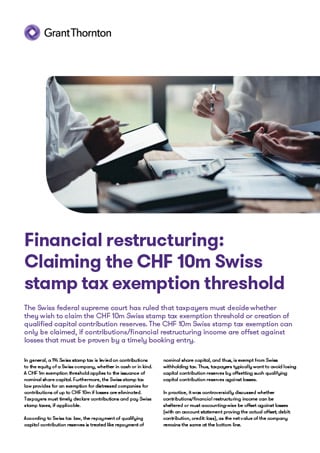-
Audit Industry, Services, Institutions
More security, more trust: Audit services for national and international business clients
-
Audit Financial Services
More security, more trust: Audit services for banks and other financial companies
-
Corporate Tax
National and international tax consulting and planning
-
Individual Tax
Individual Tax
-
Indirect Tax/VAT
Our services in the area of value-added tax
-
Transfer Pricing
Our transfer pricing services.
-
M&A Tax
Advice throughout the transaction and deal cycle
-
Tax Financial Services
Our tax services for financial service providers.
-
Advisory IT & Digitalisation
Generating security with IT.
-
Forensic Services
Nowadays, the investigation of criminal offences in companies increasingly involves digital data and entire IT systems.
-
Regulatory & Compliance Financial Services
Advisory services in financial market law and sustainable finance.
-
Mergers & Acquisitions / Transaction Services
Successfully handling transactions with good advice.
-
Legal Services
Experts in commercial law.
-
Trust Services
We are there for you.
-
Business Risk Services
Sustainable growth for your company.
-
IFRS Services
Die Rechnungslegung nach den International Financial Reporting Standards (IFRS) und die Finanzberichterstattung stehen ständig vor neuen Herausforderungen durch Gesetzgeber, Regulierungsbehörden und Gremien. Einige IFRS-Rechnungslegungsthemen sind so komplex, dass sie generell schwer zu handhaben sind.
-
Abacus
Grant Thornton Switzerland Liechtenstein has been an official sales partner of Abacus Business Software since 2020.
-
Accounting Services
We keep accounts for you.
-
Payroll Services
Leave your payroll accounting to us.
-
Real Estate Management
Leave the management of your real estate to us.
-
Apprentices
Career with an apprenticeship?!

In general, a 1% Swiss stamp tax is levied on contributions to the equity of a Swiss company, whether in cash or in kind. A CHF 1m exemption threshold applies to the issuance of nominal share capital. Furthermore, the Swiss stamp tax law provides for an exemption for distressed companies for contributions of up to CHF 10m if losses are eliminated. Taxpayers must timely declare contributions and pay Swiss stamp taxes, if applicable.
According to Swiss tax law, the repayment of qualifying capital contribution reserves is treated like repayment of nominal share capital, and thus, is exempt from Swiss withholding tax. Thus, taxpayers typically want to avoid losing capital contribution reserves by offsetting such qualifying capital contribution reserves against losses. In practice, it was controversially discussed whether contributions/financial restructuring income can be sheltered or must accounting-wise be offset against losses (with an account statement proving the actual offset; debit: contribution, credit: loss), as the net value of the company remains the same at the bottom line.
In practice, it was controversially discussed whether contributions/financial restructuring income can be sheltered or must accounting-wise be offset against losses (with an account statement proving the actual offset; debit: contribution, credit: loss), as the net value of the company remains the same at the bottom line.
Recently, the Swiss federal supreme court has ruled that the CHF 10m Swiss stamp tax exemption threshold can only be claimed, if contributions/financial restructuring income are offset against losses (i.e. derecognition of losses) that must be proven by a timely booking entry. Thus, a taxpayer must decide at the time of execution of a financial restructuring measure whether to claim the CHF 10m Swiss stamp tax exemption threshold or creation of qualified capital contribution reserves.
It is key that financial restructuring measures (whether a debt-equity swap, waiver, cash or in kind contributions, cash roundtrip, contribution agreement, capital decrease and subsequent increase, repurchase of a receivable, step-up of real estate properties and participations, factoring, bridge loan, assumption/release of debt etc.) are properly planned from an accounting, legal and tax perspective.
Proper planning not only ensures application of the CHF 10m Swiss stamp tax exemption threshold and qualifying capital contribution reserves but may also ensure that a further extended waiver of the Swiss issue tax in cases of obvious hardship can be claimed. In addition, planning may ensure application of an exemption from Swiss corporate income tax for contributions/financial restructuring income which may save tax loss carry forwards for Swiss corporate income tax purposes.
Grant Thornton Switzerland/Liechtenstein would be pleased to further advise.


